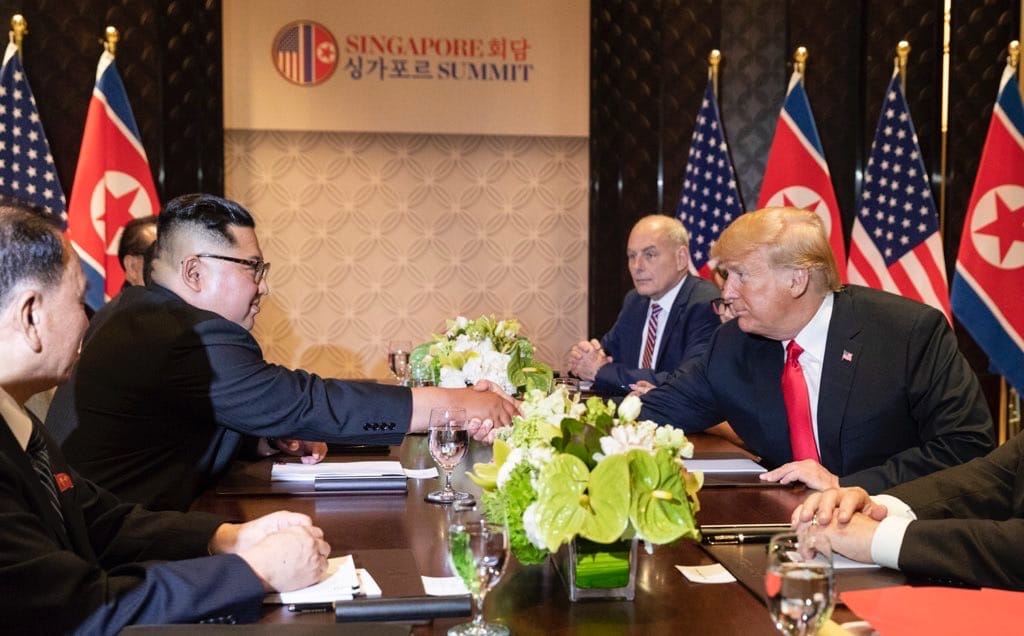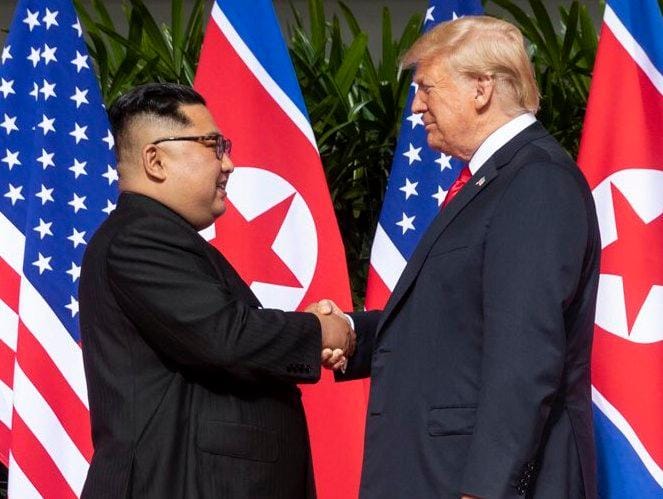
Donald Trump’s diplomacy with North Korea shows the hollowness of his oath to “preserve, protect and defend the Constitution of the United States”. Rather than serving his nation’s interest, the former reality TV star is using the presidency to stroke his ego.
The day after the Singapore Summit, the President reassured Americans that “there is no longer a nuclear threat from North Korea”.
In Trump’s mind, his negotiation prowess and “great chemistry” with Kim Jong-un “have solved that problem”. But the regime’s nuclear weapons and ballistic missiles are still there, there’s no plan for their removal, and Pyongyang’s track record in denuclearisation gives little cause for optimism.
Moreover, while the summit lowered the risk of war between Washington and Pyongyang, it was Trump who helped raise it in the first place by breaking the longstanding taboo of presidents making explicit nuclear threats.
Kim’s growing nuclear capabilities are a grave danger, but he has little incentive to attack either the US or its treaty allies, South Korea and Japan. This would ignite a conflict that Kim would ultimately lose. Pyongyang is keenly aware of its vulnerability; its hyperbolic threats are well-honed tools for heightening tensions and extracting concessions.

Rather than ignoring Pyongyang’s provocations, Trump dragged the world to the nuclear brink to prove whose “Nuclear Button” is bigger. This sparked calls in Congress to limit the thin-skinned President’s first-strike authority. To some, the acute risk to peace was Trump himself.
His impulsive decision to meet Kim, which blindsided US advisers and allies alike, didn’t stem from an impartial assessment of the national interest.
Political scientist Ian Bremmer believes Trump wanted “to do something no other president could do”.
“He wanted to say, ‘This was about me, and I made this happen’.”
Trump is as comfortable playing the peacemaker as he is the provocateur—the spotlight is what matters. In January, the US President asked his South Korean counterpart to publicly give him credit for the inter-Korean Olympics détente. President Moon Jae-in obliged, flattering Trump further by claiming him worthy of the Nobel Prize. After Singapore, Moon lauded Trump for achieving “a feat that no one else has delivered”.
Read more: A denuclearised Korean peninsula? Not quite yet
But this historic summit almost didn’t happen.
In late May, Trump cancelled the meeting in an open letter he dictated to Kim. The message did not cite the vast gulf between the two leaders’ positions, or any other substantive reason for withdrawing. (It did, however, remind Kim that Trump’s nuclear arsenal is superior.)
Trump’s rationale was that Chairman Kim had dissed him by showing “tremendous anger and hostility”. Donald Trump’s ego was bruised, and he cancelled the summit in a fit of presidential pique. He didn’t bother telling Moon first.
With things patched up and the summit back on, the biggest risk was that Trump would give too much away and throw the allies under the bus in the process. That’s exactly what he did.
In return for a vague rehash of two previous failed agreements, Kim got everything he wanted to help keep his brutal regime running: recognition as a nuclear power, de facto sanctions relief from China, entrée to the world diplomatic stage, and some killer propaganda fodder for the folks back home.
Trump tossed in a bonus by cancelling semi-annual military exercises with South Korea, shocking Seoul, Tokyo and the Pentagon alike. China and Russia are doubtless pleased by the fissures within the US alliance network. Bremmer is right: “Trump clearly gets what he wants much more than the United States does.”
Read more: A dangerous game of chicken on the Korean peninsula
After June’s “G6 + 1” summit, it’s no surprise that Trump would treat America’s allies callously. The President showed far more respect to the world’s last totalitarian leader than he did to the democracies in the G7. He tweeted that Canadian Prime Minister Justin Trudeau is “very dishonest [and] weak”, but praised Kim as a “tough guy”, a “smart guy” and “a great negotiator”.
He glossed over Kim’s well-documented human rights abuses, the same crimes he’d previously denounced. Cutting deals with dictators is an unpleasant duty of statecraft, but Trump’s affinity for authoritarians at the expense of US interests and values exceeds any possible notion of expedience. Something deeper is at work here – or rather, something very shallow.
Why does Trump consistently coddle autocrats such as Vladimir Putin, Xi Jinping and Kim? Perhaps it’s pragmatism after all. Dictators are freer to give him what he wants than elected leaders constrained by voters, civil society and the rule of law. The trouble with this argument is that it doesn’t explain the lengths Trump goes to praise leaders with relatively little to offer him. His April 2017 phone call to Philippines President Rodrigo Duterte is telling.
“I just wanted to congratulate you because I’m hearing of the unbelievable job on the drug problem,” Trump reportedly said, in reference to the thousands of extrajudicial killings that comprise Duterte’s signature policy.
Trump’s affinity for authoritarians at the expense of US interests and values exceeds any possible notion of expedience.
Is Trump a closet fascist, as some claim? That’s giving the President’s world view more coherence than it deserves. Trump inhabits a masculinised, transactional world where every exchange is zero-sum and winning supersedes all other priorities. (It’s this mindset that led to his macabre claim that victims of Kim’s gulags are “the greatest winners” of the summit.) This is unhealthy for democracy, but it doesn’t amount to a political ideology.
Nor is it the case that Trump is irrational. The American President is ill-prepared and unpredictable, but that’s beside the point. Rationality means making choices that get you what you want. It’s true that by making unilateral concessions to North Korea, Trump has lost bargaining leverage and shown weakness – the cardinal sin within his own macho discourse. But Trump doesn’t care about consistency, only short-term wins. In that context, a vacuous summit where the President made history and did what none of his feckless predecessors could do served nicely.
The US President is not irrational. He does what he wants. It’s just that what he wants is shaped by his transactional world view and deep insecurities.
What America’s allies, and even the American people, want doesn’t matter to him at all.





